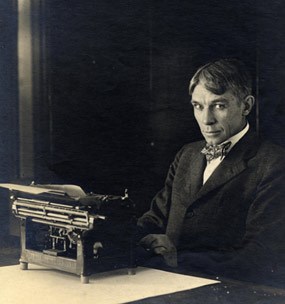
Carl Sandburg moved to Chicago with his wife Lilian and one year-old daughter, Margaret in 1912 from Milwaukee. He worked first as a reporter for the Chicago Day Book from 1912-1917, then was hired to write for the Chicago Daily News in 1917. He also contributed occasional articles to the International Socialist Review, often using the pseudonym Jack Phillips. Sandburg’s early writings tackled social justice, human dignity, and labor rights. As a labor reporter for the Chicago Daily News he saw unsafe and poor working conditions in factories, mines and mills, the absence of child labor laws and other benefits lacking for the working person. He was also struggled to find an outlet for his poetry. In 1914 Harriet Monroe of Poetry magazine published six of his radical, muscular poems in the March issue of her forward-looking journal and awarded him the first Levinson Prize for his poem Chicago. The Levinson prize was as distinctive as if he had won a Pulitzer Prize as at the time there was not a Pulitzer Prize for poetry. This first significant recognition of his poetry brought him literary friendships with Edgar Lee Masters, Theodore Dreiser, Vachel Lindsay, Amy Lowell, Alice Corbin Henderson, Floyd Dell, Sherwood Anderson, and others. His friendships with these prominent writers encouraged him to compile his first collection of poems, Chicago Poems, in 1916. Carl Sandburg's poem Chicago became one of the best known works of 20th century American literature. Included in countless anthologies, this poem made famous the description of Chicago as "City of the Big Shoulders," celebrating its role at the time as the industrial capital of the United States. It’s a description that is still used often today. Chicago They tell me you are wicked and I believe them, Carl Sandburg, Chicago Poems, 1916 His Chicago poetry celebrated and consoled people in their environments— the crush of the city, the enduring solace of the prairie. In his work as a reporter for various newspapers, Sandburg had become a skilled investigative reporter with passionate social concerns. He covered war, racial strife, lynchings, mob violence, and the inequities of the industrial society, such as child labor. Chicago offered Sandburg an opportunity to portray those ideals with such vivid poetic imagery that Sandburg and Chicago are undeniably linked. The 1919 Chicago race riots that he documented furthered his belief that a common dignity was a right for all, not some. He wrote “Here is the difference between Dante, Milton and me. They wrote about hell and never saw the place. I wrote about Chicago after looking the town over for years and years." They Will Say Carl Sandburg - Chicago Poems
Psalms of Those Who Go Forth Before Daylight Carl Sandburg, Chicago Poems, 1916 |
Last updated: April 14, 2015
